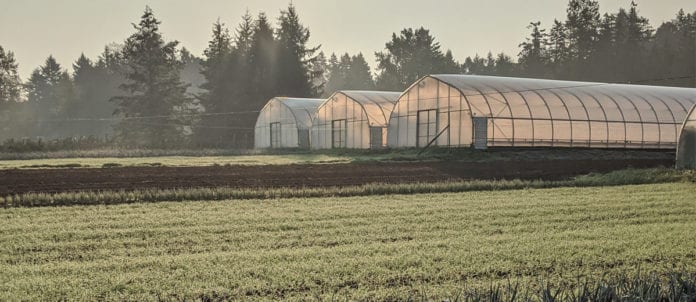In March 2020, when the B.C. government shut down restaurants to help curb the spread of COVID-19, local farmers lost a valuable market in its ripple effect throughout the food supply chain. Shawn Dirksen, owner of Northstar Organics in Saanichton, B.C., has since been capitalizing on new digital sales tools as the province’s food and agriculture industry settles into the new normal.
“About 25 per cent of our sales went to restaurants, but we immediately lost those sales during the first lockdown,” says Dirksen.
Raised on a fruit farm in St. Catharines, Ont., Dirksen continues a multi-generational passion for farming in Western Canada. In 2016, he purchased a 10-acre farm off Bear Hill Road in Central Saanichton, where he grows a variety of organic fruits and vegetables, including, but not limited to, blueberries, raspberries, tomatoes, cucumbers and eggplants. The produce is sold year-round at farmers’ markets, restaurants and independent grocers.
Despite Dirksen’s initial concerns in the wake of the pandemic, the demand for local food products grew exponentially, leading to the development of new direct-to-consumer strategies for farmers throughout the province.
With the help of agriculture funding programs offered by the provincial government, many farmers’ markets have registered to use an online-shopping portal called Local Line to help facilitate sales and enable customers to continue accessing fresh food. A provincial grant of $55,000, provided by the B.C. Association of Farmers’ Markets, has covered the fees for roughly 70 markets and its vendors to join the platform and set up an online store.
“I was really lucky because all the farmers’ markets that I’m a part of decided to stay open after a series of protocol and location changes to maintain physical distancing,” says Dirksen. “Local Line, which we continue to use, allows customers to pre-order online and pickup at their local market without having to wait in a line or getting too close to anyone. It’s just a really simple, low-contact way of distributing food.”
Additionally, the Rapid Relief Fund provided a grant of $485,000 to the Victoria Community Hub Society to assist farmers and secure local food for vulnerable communities. The money went towards creating the South Island FarmHub, an online store for wholesale purchasers, local restaurants and community organizations that officially launched in June 2020.
“We’ve sold a lot of produce through FarmHub, which is a new wholesale outlet for us,” says Dirksen. “It’s helped fill the gaps in our sales.”
Dirksen has demonstrated resilience and flexibility throughout the COVID-19 pandemic, and he’s confident these new concepts will leave a permanent mark on the local farming industry.
“I want to hold onto these concepts,” says Dirksen. “They’ve worked well and are preferable compared to what we were doing before. It’s much more organized.”
Dirksen says he doesn’t plan to export produce outside of the province. Instead, he wants to focus on improving local distribution and reducing waste. For local farmers who might be looking to scale up, Dirksen offers a bit of advice.
“Direct-to-consumer sales are the most rewarding for your work. It’s worth it to try and produce as much as you can on the land base you feel comfortable producing on, based on all the extra sales that are available now.”
Written by Nicole Di Tomasso


















